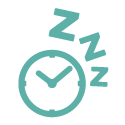Shift Work Sleep Disorder
Disrupted Sleep Due to Rotating or Irregular Work Shifts
A HEALTHIER YOU
Tackle Shift Work Sleep Disorder For a Healthy Life
Night shifts or non-traditional working hours that do not match the body’s natural circadian rhythm often cause sleep issues. Work with us to regain your sleep.
What is Shift Work Sleep Disorder?
SWSD is not just a case of feeling tired after a long night of work. It's a legitimate sleep disorder. People who work non-traditional hours — working at night and sleeping in the day — are at risk of SWSD. This change in routine affects the body's natural circadian rhythm.
We offer you a complete guide on how you can improve your sleep while also doing your work. Talk to our experts. Your health deserves it, and together we can make a significant difference in your sleep.
What hormones are involved in Shift Work Sleep Disorder?
Two main hormones are involved in SWSD.
1. Melatonin:
It is produced by the pineal gland in the brain. Its amount is highest at night (dark) and minimum during the day (light). It plays a key role in sleep.
2. Cortisol: Its levels are low during the evening and highest before you wake up in the morning. It also plays a role in maintaining the sleep cycle.
How does Shift Work Sleep Disorder affect sleep?
SWSD is a condition that affects individuals who work during the night or have irregular work schedules. Our bodies have an internal clock, known as the circadian rhythm, which regulates the sleep-wake cycle. When we disrupt this natural cycle by working during typical sleep hours, it can lead to a range of sleep-related problems including SWSD.
What are the Symptoms of Shift Work Sleep Disorder?
- Drowsiness
- Irritability
- Feeling gloomy
- Head throbbing headaches
- Up to 72 hours lasting migraines
- Cluster headaches
- Fatigue
- Depression
- Lack of energy
How to manage?
Shift Work Sleep Disorder
Tips for Managing Shift Work Sleep Disorder:

Establish a consistent sleep schedule
Maintain a regular sleep routine, even on days off, to regulate your body's internal clock and improve sleep quality.

Create a sleep-friendly environment
Ensure your sleep environment is conducive to rest by keeping it dark, quiet, and comfortable.

Limit caffeine and stimulants
Reduce or avoid caffeine and stimulant intake, especially in the hours leading up to your intended sleep time.

Short naps (20-30 minutes)
Strategic short naps can provide a brief energy boost without disrupting nighttime sleep patterns.

Healthy eating habits
Adopt a balanced and nutritious diet to support your overall health, including maintaining stable energy levels during shift work.

Seek professional help
If sleep difficulties persist, consult with a healthcare professional for personalized advice and guidance on managing Shift Work Sleep Disorder.
- Shah A, Turkistani A, Luenam K, Yaqub S, Ananias P, Jose AM, Melo JP, Mohammed L. Is shift work sleep disorder a risk factor for metabolic syndrome and its components? A systematic review of cross-sectional studies. Metab Syndr Relat Disord. 2022;20(1):1–10. doi:10.1089/met.2021.0070.
- Ganesan S, Magee M, Stone JE, Mulhall MD, Collins A, Howard ME, Lockley SW, Rajaratnam SMW, Sletten TL. The impact of shift work on sleep, alertness and performance in healthcare workers. Sci Rep. 2019;9(1):4635. doi:10.1038/s41598-019-40914-x.
- Razavi P, Devore EE, Bajaj A, Lockley SW, Figueiro MG, Ricchiuti V, Gauderman WJ, Hankinson SE, Willett WC, Schernhammer ES. Shift work, chronotype, and melatonin rhythm in nurses. Cancer Epidemiol Biomarkers Prev. 2019;28(7):1177–1186. doi:10.1158/1055-9965.EPI-18-1018.



